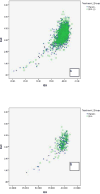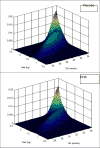Predicting the effect of maternal docosahexaenoic acid (DHA) supplementation to reduce early preterm birth in Australia and the United States using results of within country randomized controlled trials
- PMID: 27637340
- PMCID: PMC5028118
- DOI: 10.1016/j.plefa.2016.08.007
Predicting the effect of maternal docosahexaenoic acid (DHA) supplementation to reduce early preterm birth in Australia and the United States using results of within country randomized controlled trials
Abstract
The DHA to Optimize Mother Infant Outcome (DOMInO) and Kansas DHA Outcomes Study (KUDOS) were randomized controlled trials that supplemented mothers with 800 and 600mg DHA/day, respectively, or a placebo during pregnancy. DOMInO was conducted in Australia and KUDOS in the United States. Both trials found an unanticipated and statistically significant reduction in early preterm birth (ePTB; i.e., birth before 34 weeks gestation). However, in each trial, the number of ePTBs were small. We used a novel Bayesian approach to estimate statistically derived low, moderate or high risk for ePTB, and to test for differences between the DHA and placebo groups. In both trials, the model predicted DHA would significantly reduce the expected proportion of deliveries in the high risk group under the trial conditions of the parent studies. Among the next 300,000 births in Australia we estimated that 1112 ePTB (95% credible interval 51-2189) could be avoided by providing DHA. And in the USA we estimated that 106,030 ePTB (95% credible interval 6400 to 175,700) could be avoided with DHA.
Trial registration: ClinicalTrials.gov NCT00266825.
Keywords: Docosahexaenoic acid; Early preterm birth; Pregnancy; Randomized controlled trials.
Copyright © 2016 Elsevier Ltd. All rights reserved.
Conflict of interest statement
The other authors declare no conflicts of interest. All authors read and approved the final manuscript.
Figures


References
-
- Olsen SF, Hansen HS, Jensen B, Sorensen TI. Pregnancy duration and the ratio of long-chain n-3 fatty acids to arachidonic acid in erythrocytes from Faroese women. Journal of internal medicine Supplement. 1989;731:185–189. - PubMed
-
- Olsen SF, Sorensen JD, Secher NJ, Hedegaard M, Henriksen TB, Hansen HS, Grant A. Randomised controlled trial of effect of fish-oil supplementation on pregnancy duration. Lancet. 1992;339:1003–1007. - PubMed
-
- Makrides M, Duley L, Olsen SF. Marine oil, and other prostaglandin precursor, supplementation for pregnancy uncomplicated by pre-eclampsia or intrauterine growth restriction. The Cochrane database of systematic reviews. 2006:Cd003402. - PubMed
-
- Makrides M, Gibson RA, McPhee AJ, Yelland L, Quinlivan J, Ryan P. Effect of DHA supplementation during pregnancy on maternal depression and neurodevelopment of young children: a randomized controlled trial. Jama. 2010;304:1675–1683. - PubMed
Publication types
MeSH terms
Substances
Associated data
Grants and funding
LinkOut - more resources
Full Text Sources
Other Literature Sources
Medical

